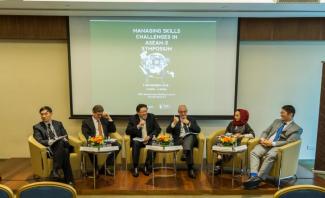
What are some of the skills challenges and disruptions that ASEAN-5 countries (Singapore, Malaysia, Thailand, Indonesia and Philippines) face and how can each country cope with these challenges?
About 80 audience members comprising corporate leaders, policy makers, non-governmental organisations, as well as faculty, staff, alumni and students from Singapore Management University (SMU), heard various viewpoints from a panel of thought leaders at the Managing Skills Challenges in ASEAN-5 Symposium. The event on 1 November 2016 was hosted by the SMU, in partnership with J.P. Morgan.
The half-day session kicked off with opening remarks from Professor Arnoud De Meyer, President of SMU where he posed the question of whose role was it to take the lead to help the economy cope with skills challenges while Mr Edmund Lee, Senior Country Officer, Singapore, J.P. Morgan said that JP Morgan was committed to supporting economic growth in the region.

[Photo: Guest-of-honour Dr Noeleen Heyzer giving the keynote address on A New Growth Model for ASEAN: Towards Sustainable and Shared Prosperity]
Dr Noeleen Heyzer, Social Scientist and Former Under-Secretary-General of the United Nations and Lee Kong Chian Distinguished Fellow, School of Social Sciences, SMU, then gave the keynote address on A New Growth Model for ASEAN. She said that ASEAN-5’s potential as a major growth engine for ASEAN could only be unleashed if there was a social foundation that invested in people and their capacities and skills. She added that in order to have sustainable economic development, this required a mindset change – a move from focusing only on individual countries strengths to collective regional strengths, where various resources and skills would give rise to complementarities and opportunities for mutually beneficial exchanges. ASEAN also needed to move from “quantity” to “quality” of growth – that is, from being dependent on factory Asia with cheap, semi and unskilled labour to an innovation growth model based on skilled, educated, healthy and technologically savvy workforce that will push the frontiers of the region’s technology and knowledge based industries.
In order to achieve a people-centered ASEAN and its aim to be RICH – resilient, inclusive, competitive and harmonious – by 2030, Dr Noelene stressed the importance to forge partnerships and work together to harness the potential, energies, ideas and talents of the private, public, educational sectors and citizens themselves; uniting around problems and generating solutions that work for all.

[Photo: Professor James Tang presented research findings on Managing Skills Challenges in ASEAN-5]
Professor James Tang, Dean, School of Social Sciences, SMU, then presented research findings from a year-long study on skills challenges in key growth areas of ASEAN-5. The study by a multi-disciplinary research team led by Professors Tan Kim Song and James Tang, in partnership with J.P. Morgan, can be read here.
With Associate Professor Tan Kim Song, School of Economics SMU, as moderator, the five-member panel discussion on Coping with Disruptive Forces on Skills Training addressed how ASEAN-5 could respond to disruptions from global forces and domestic constraints. The panel comprised:
Arnoud De Meyer
President, Singapore Management University
Chauncy Lennon
Managing Director and Head of Workforce Initiatives, Global Philanthropy, J.P. Morgan
Somkiat Tangkitvanich
President, Thailand Development and Research Institute
Shinta Witoyo Dhanuwardoyo
Founder & CEO of Bubu.com / Angel Investor and Mentor to Tech Startups
Co- Founder of VCNETWORK.Co and Co- Founder of Angel eQ Network
Miguel Francisco Caparas
Co-founder, NXT LVL Academy
The symposium closed with the launch of the J.P. Morgan – Education Development Centre (EDC) Partnership, which would see innovative programmes implemented to help young people in ASEAN gain technical and employability skills that employers are demanding in the region’s dynamic digital economy.

[Photo: Professor Arnoud De Meyer, placing his signature on the project banner by EDC]
[Featured Photo: The panel discussion on Coping with Disruptive Forces on Skills Training comprised (left to right) Somkiat Tangkitvanich, President, Thailand Development and Research Institute; Chauncy Lennon, MD and Head of Workforce Initiatives, Global Philanthropy, J.P. Morgan; Tan Kim Song, School of Economics, SMU; Arnoud De Meyer, SMU President; Shinta Witoyo Dhanuwardoyo, Founder & CEO of Bubu.com / Angel Investor and Miguel Francisco Caparas, Co-founder, NXT LVL Academy.]
For more information on the study and partnerships, please refer to these media releases: